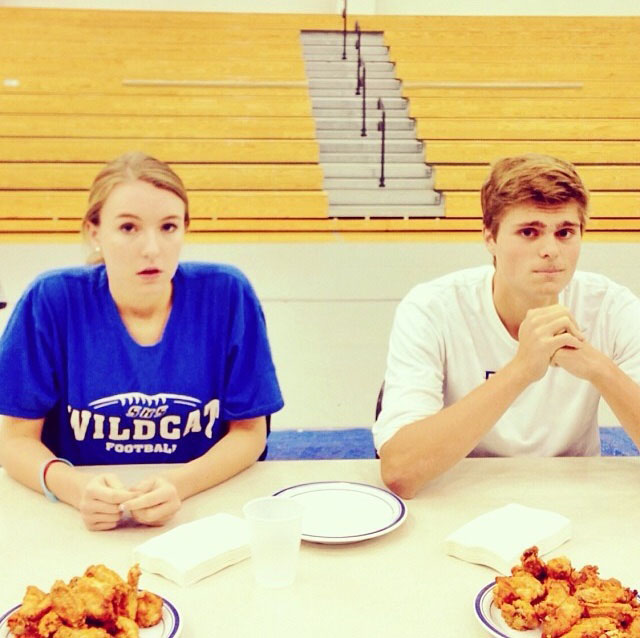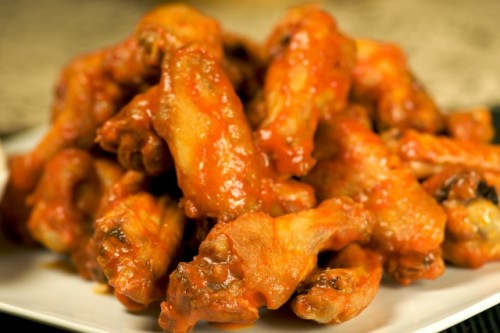Spirit Week, as the name implies, is one filled with both school and team spirit. Steeped in tradition, Spirit Week also corresponds with the season of giving, which is manifested in the annual Can Drive. It is a week of school competition, generosity, and blatantly excessive indulgence and gluttony. For at the same time that we, as Upper School students, bring in cans, patting ourselves on our backs and looking forward to the promise of a dress down day, we also make sure that we set aside a time to stand around eight of our classmates, screaming and cheering as they stuff their faces full of chicken wings.

Photo courtesy of Madeline Blommer ’14
The Wing-bowl is the most marvelous and awesome of all our spirit traditions in the sense that we can’t help but marvel and wonder at what value this tradition has. We struggle to find justifiable value in a competition that embodies pure overconsumption, but for some reason we keep doing it. At some point, however, we need to take a step back, really look at what we’re doing, and ask ourselves, “Is there anything ironic about this picture?” We believe that in a season of Thanksgiving and appreciation for what we have, the Wing-bowl demonstrates a lack of discretion by glorifying gluttony.
What does school spirit really mean? We believe that spirit activities should both unite the school and bolster enthusiasm within the community while also remaining true to the school’s values. In response to those who would claim that the Wing-bowl is a tradition and therefore deserves to remain, we would counter that age and repetition alone do not merit the designation of a tradition. Even if it did, there comes a time when the quality and virtue of a tradition must be reevaluated. Such is the case with the Wing-bowl.

Photo Courtesy of Mike’s Table
Now aside from the flagrant deviation from the core values of the school–generosity and self-control just to name two–the Wing-bowl certainly does not exude an air of good health. According to Dr. Kelley Bethoney, a member of the Episcopal Science Department, during the Wing-bowl, contestants are essentially “consuming multi-days’ worth of calories in a single span of time.” As a result, “[The eater’s] belly would be distended because [he or she] would be stretching it beyond what it should normally have at a mealtime…. [His or her] salt levels would also go through the roof.” The competitors will then most likely “feel sluggish and bloated and will probably have some acid reflux coming up.” This isn’t exactly how we want our athletes feeling a couple days before their big games. Massive amounts of protein are being consumed by the competitors, which, as many athletes should know, “will make your body feel sluggish,” added Bethoney. So at the very least, if smothering the Stripes in hot sauce and throwing them in the trash with half-eaten chicken-wings doesn’t dissuade you from supporting the Wing-bowl, maybe the threat of vomiting, sluggishness, and general discomfort will.
Let’s look at what we’ve gained at the end of the Wing-bowl: 100 points for a class that demonstrates their wing-eating ability, which then somehow translates into class spirit, and a whole lot of food wasted. In a wider view though, this is not an issue isolated to EA. This culture of gluttony is far more pervasive and persistent, manifesting itself in publicized, and even televised, eating contests. Those like Nathan’s Hot Dog Eating Contest and the Annual Wing Bowl in Philadelphia continue to promote a culture of excess and, quite literally, of conspicuous consumption. Is there no better use for those 66 hot-dogs scarfed down by one man in twelve minutes and then vomited up a few moments later? Or for those chicken wings, which are treated as inconsequential props for entertainment? Eating for the sake of winning is not a sport. Perhaps the real prize of the Wing-bowl is becoming champions of American overconsumption. Moving forward let’s be more aware of our actions, our traditions, and the implications of what we are doing.